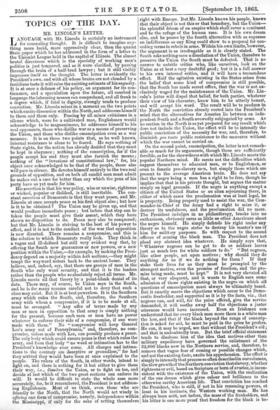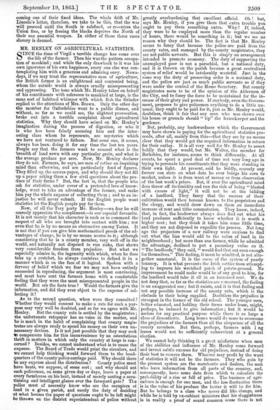TOPICS OF THE DAY.
MR. LINCOLN'S LETTER.
T ANGUAGE with Mr. Lincoln is certainly no instrument 1J for concealing thought. It is difficult to imagine any- thing more lucid, more oppressively clear, than the quaint State paper which he has addressed in the form of a letter to the Unionist League held in the capital of Illinois. The almost brutal directness which is the specialty of working men's politics is just tempered, and as it were clarified, by passing through the brain of a half-bred lawyer ; but it still visibly impresses itself on the thought. The letter is evidently the President's own, and with all whose brains are not clouded by a fastidious taste it will raise the existing estimate of his sagacity.
It is at once a defence of his policy, an argument for its con- tinuance, and a speculation upon the future, all couched in language the labouritbe, masses can comprehend, and all frank to a degree which, if fatal to dignity, strongly tends to produce conviction. Mr. Lincoln seizes in a moment on the two points which excite dissension within the North, and addresses himself to them and them only. Passing by all minor criticisms in a silence which, were he a cultivated man Englishmen would acknowledge to be magnanimous, he addresses himself to his real opponents, those who dislike war as a means of preserving the Union, and those who dislike emancipation even as a war measure. It is on these two points that, as he well knows, internal resistance is alone to be feared. He says nothing of State rights, for the nation has already decided that they must be kept in abeyance nothing of the conscription, for if the people accept his end they must also furnish the means ; nothing of the "invasions of constitutional law," for, his object once acknowledged to be that of the people those also will pass in silence. He devotes himself entirely to people, two real grounds of opposition, and on both all candid men must admit he makes out a case far better than any which the pens of his party have as yet made for him. His assertion is that his war policy, wise or unwise, righteous or wicked, popular or disliked, is still inevitable. The con- stant assertion of Democrats is that they want peace, and Mr. Lincoln at once accepts peace as his first object also ; but how is it to be obtained ? The Union may be given up, and that would produce immediate peace ; but before that step can be taken the people must give their assent, which they have shown no disposition to do. Peace may also be conquered; but that Mr. Lincoln is striving to the best of his power to effect, and it is not to the conduct of the war that opposition is now directed. There remains a compromise, and this is the solution to which Democrats really look. They think in a vague and ill-defined but still very evident way that, by offering the South new guarantees or new powers, or a new position within the Union,—for example, by making the Presi- dency depend on a majority within Loth sections,—they might tempt the wayward sisters back to the ancient home. They believe, and, indeed, say, that there are groups of men in the South who only want security, and that it is the leaders rather than the people who so absolutely reject all terms. Mr. Lincoln meets all that theory by a point-blank denial of its data. There may, of course, be Union men in the South, and he is for many reasons careful not to deny that such a class may exist. But it is at best powerless. It is the Southern army which rules the South, and, therefore, the Southern army with whom a compromise, if it is to be made at all, must be arranged. "Any offer of terms made by any man or men in opposition to that army is simply nothing for the present, because such man or men have no power whatever to enforce their side of a compromise, if one were made with them." No "compromise will keep General Lee's army out of Pennsylvania," and, therefore, no com- promise, unless made with Lee, can possibly produce a peace. The only body which could ensure peace is that which rules the army, and from that body "no word or intimation has to the President's knowledge ever come. All charges and intima- tions to the contrary are deceptive or groundless," for had they arrived they would have been at once explained to the people. The rulers of the South, in other words, intend to fight on, and there is nothing for it but either to give them their way, i.e., dissolve the Union, or to fight on too, and decide at last which of the two great sections can enforce its will. It would be difficult to state the whole ease more accurately, for, be it remembered, the President is not address- ing Englishmen. Most of us think, even those who are friendly to the North, that the North would act wisely in offering one form of compromise namely, independence within the Mississippi, if only for the sake of setting themselves right with Europe. But Mr. Lincoln knows his people, knows that their object is not this or that boundary, but the Union— the splendid dieam of an empire which shall cover a continent and be the refuge of the human race. It is his own dream also, and he passes by the fourth alternative with as supreme- an indifference as any King could show to a proposal for con- ceding terms to rebels in arms. Within his own limits,lowever, the argument is as irrefragable as it is clearly stated. The South asks nothing save adissolution of the Union, therefore to preserve the Union the South must be defeated. That is no answer to outside critics who, like ourselves, look on the Union as at best a very doubtful good; but it is a full answer to his own internal critics, and it will have a tremendous effect. Half the agitation existing in the States arises from the belief that some kind of compromise is still possible, that the South has made secret offers, that the war is not ex- clusively waged for the maintenance of the Union. Mr. Lin- coln's letter will dispel that belief, for both parties, whatever their view of his character, know him to be utterly honest, and will accept his word. The result will be to produce in the North the conviction already rooted into the President's mind that the alternatives for America lie between an inde- pendent South and a South avowedly subjugated by arms. As no section in the North is as yet prepared for any result which does not include the Union, the effect will be to intensify the public conviction of the necessity for war, and, therefore, to diminish pro tan to public resistance to the measures without which the war cannot be carried on.
On the second point, emancipation, the letter is not remark- able so much for its arguments, though these are sufficiently forcible, as for the shrewdness with which Mr. Lincoln meets the popular Northern mind. He meets not the difficulties which suggest themselves to educated men, or to Englishmen, or even to fanatic pro-slavery men, but simply those which are present to the average American brain. He does not say that the negro being a man has a right to be free, though he implies that that is his private thought, but argues the matter simply on legal grounds. If the negro is anything except a citizen of the United States or an alien sojourning there, in either of which cases the proclamation was at least legal, he is property. Being property used to assist the war, the Com- mander-in-Chief of the Army had a right to seize it, or destroy its usefulness, and the proclamation did no more. The President indulges in no philanthropy, breaks into no enthusiasm, obviously cares as little as other Americans about the negro himself. He simply defends his right under any theory as to the negro status to destroy his master's use of him for military purposes. So with respect to the second offence of arming the black man. The President does not plead any abstract idea whatever. He simply says that, "Whatever negroes can be got to do as soldiers leaves just as much less for white soldiers to do." "ut negroes, like other people, act upon motives ; why should they do anything for us if we do nothing for them ? If they stake their lives for us they must be prompted by the strongest motive, even the promise of freedom, and the pro- mise being made, must be kept." It is not very elevated all that, or very eloquent, and it wants to English ears some admission of those rights existing in the negro on which all questions of emancipation must always be ultimately based. But it exactly meets the objections which occur to the Demo- cratic freeholder, and supported as it is by the facts, viz., that negroes can, and will, for the price offered, give the service demanded, it will soothe away half the objections a juster utterance would have increased.. Even an Irishman can- understand that for every black man more there is a white man the less, and that if the black beyond the range of conscrip- tion is asked for aid, he must be paid in the price he prefers. He can, it may be urged, see that without the President's aid; and that is undoubtedly true. But the brief official statement tends to disabuse him of the idea that motives other than military expediency have governed the enlistment of. the 22,000 blacks now in the Northern service, and, therefore, to remove that vague fear of coming or possible changes which, and not the existing facts, excite his apprehension. The effect is simply to intensify that process so often describedin our columns, the slow growth of the Northern conviction that e]avery, whether righteous or evil, based on Scripture or born of avarice, is incon- sistent with the existence of the Union, with the realization of the one dream which gives colour and brilliance to the otherwise earthy American life. That conviction has reached the President, who is still, if not in his reasoning powers' at least in his instincts, the Western working man. He has always been with, not before, the mass of the freeholders, and his letter is one more proof that freedom for the black is be-
coming one of their fixed ideas. The whole drift of Mr. Lincoln's letter, therefore, we take to be this, that the war will proceed until the South is subdued, or re-enters the Union free, or by freeing the blacks deprives the North of their one essential weapon. In either of those three cases slavery is doomed.































 Previous page
Previous page